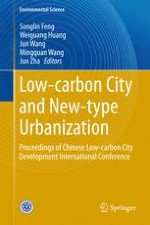2015 | OriginalPaper | Buchkapitel
Energy-Related Carbon Emissions in Shanghai: Driving Forces and Reducing Strategies
verfasst von : Chun-zeng Fan, Hai-ying Gu, Hong Jiang
Erschienen in: Low-carbon City and New-type Urbanization
Verlag: Springer Berlin Heidelberg
Aktivieren Sie unsere intelligente Suche, um passende Fachinhalte oder Patente zu finden.
Wählen Sie Textabschnitte aus um mit Künstlicher Intelligenz passenden Patente zu finden. powered by
Markieren Sie Textabschnitte, um KI-gestützt weitere passende Inhalte zu finden. powered by
